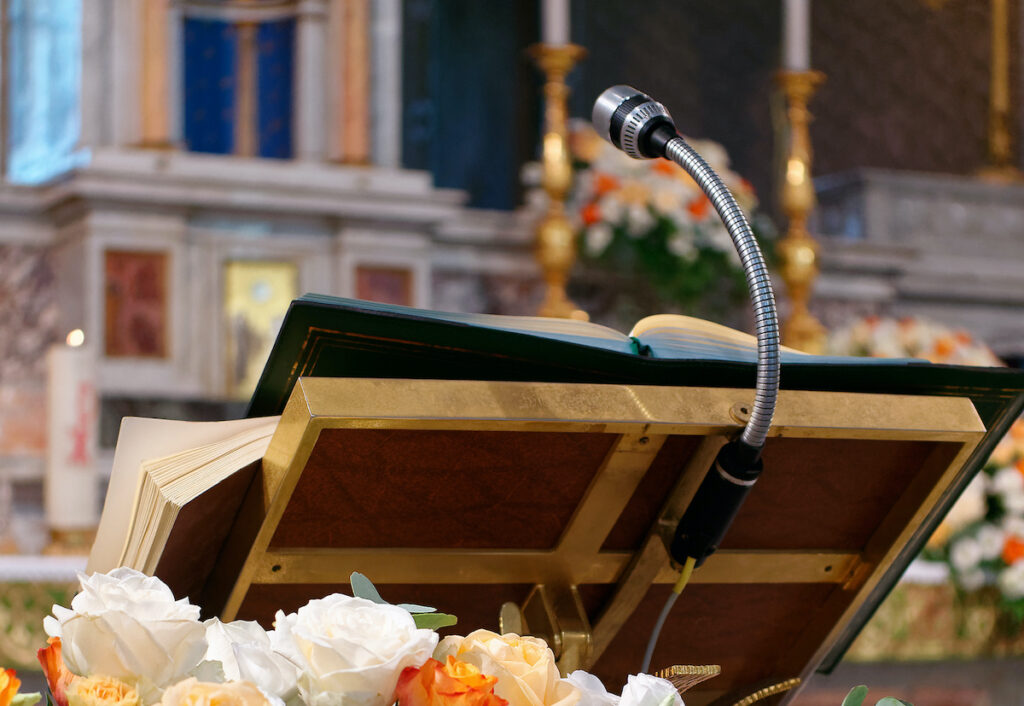Question:
If the pastor praises President Donald Trump by name during the course of a homily, isn’t that the same thing as campaigning for him? (Grand Island, Nebraska)
Answer:
A preacher — particularly in the midst of a very active and heated political campaign — needs to be very careful about seeming to praise or criticize a particular candidate. Priests are encouraged at all times to share the principles of Catholic social teaching and to encourage parishioners to participate in the political process.
In a website article titled “Do’s and Don’ts: Guidelines During Election Season,” the U.S. Conference of Catholic Bishops is very clear on activities that must be avoided (http://www.usc cb.org/issues-and-action/faithful-ci tizenship/dos-and-donts-guidelines-during-election-season.cfm).
To parishes, other Church organizations and their representatives these guidelines say: “Do not endorse or oppose candidates, political parties, or groups of candidates, or take any action that reasonably could be construed as endorsement or opposition.”
What the pastor in your question has done is a clear violation of that “reasonably could be construed” provision.
In a further specification of this caution, the Washington State Catholic Conference lists under what the Catholic Church and Catholic organizations cannot do: “endorse or oppose candidates or political parties, or actively engage in political campaigns for or against any candidate or party through homily, newsletter, flyer, poster, bulletin, email, phone, parish website links, social media, or by providing a parish mailing list.”
In a document that the national bishops’ conference revises periodically called “Forming Consciences for Faithful Citizenship,” among the subject areas that should be of concern for Catholics in weighing their voting preferences are such things as: human life, promoting peace, religious freedom, the preferential option for the poor, migration, combatting unjust discrimination and care for our common home.
Question:
Is a Catholic required to have a Catholic burial ceremony — in a church with a Mass? I am thinking of having just a graveside service instead — with a priest, but just a private ceremony. I mean no disrespect to the Church, but this might be easier for the family. (Indianapolis)
Answer:
A funeral Mass is not mandated by the Church when a Catholic dies. But it is certainly strongly encouraged. In fact, the Order of Christian Funerals says: “The Mass, the memorial of Christ’s death and resurrection, is the principal celebration of the Christian funeral” (No. 5).
It pleases me that you want a priest involved in your burial service — but the Mass is the most powerful prayer that the Church has, so why deprive yourself of that benefit? The celebration of the Eucharist commends the deceased to the mercy and compassion of the Lord, and it reminds those in attendance that death has been overcome by the sacrifice of Jesus on the cross.
So it is also educational and can thus serve to bring comfort and peace to those in attendance. It bothers me that sometimes certain funeral homes discourage the family of the bereaved from celebrating a funeral Mass, citing the extra cost of transporting the body to a church. I would surely want the strongest help that the Church can offer at the time of my passing — and that is the Eucharist.
It needn’t be a public event. You can have as many — or as few — people at the Mass as you like; that all depends on whether you decide to publish in advance the details of the ceremony. At the very least, if you decide to mark your burial without a Eucharist, you would want to arrange a Mass at a later date.
Question:
I read with sadness that a priest in New Jersey denied first Eucharist to a boy with autism because the priest believed that the boy was “unable to determine right from wrong due to his disability.” Could you please clarify the Church’s position on this?
I question whether a person’s mental status is an unambiguous reflection of what might be occurring in that person’s soul. I see individuals with Down syndrome who receive Communion regularly, so where does the Church draw the line? Would individuals with other mental challenges also be denied Communion — say, persons with schizophrenia or early onset dementia? (Sedalia, Missouri)
Answer:
By this time, you should have seen the follow-up to the situation you mention. The pastor issued an apology on the parish’s website, saying that there had been “an unfortunate breakdown in communication that led to a misunderstanding.”
“A delay in receiving the sacrament was discussed,” he said, “until readiness could be assessed; there was never to be denial of Communion to this child.” The boy, said the pastor, is “welcome in our program and will be able to receive first holy Communion this year.”
The sacramental guidelines for persons with disabilities, issued by the U.S. Conference of Catholic Bishops in 2017, explain that the criterion for reception of Communion is simply that the person be able to distinguish the body of Christ from ordinary food — “even if this recognition is evidenced through manner, gesture or reverential silence rather than verbally.”

